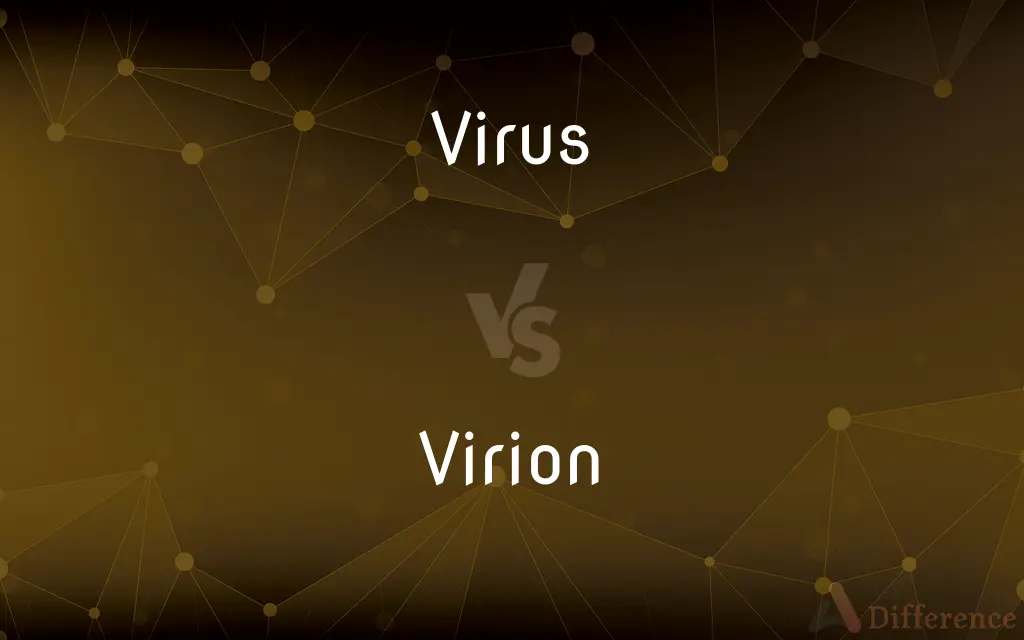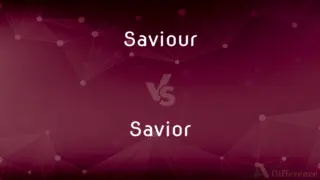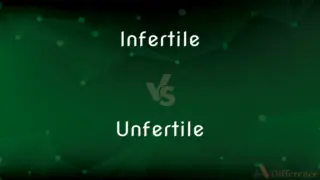Virus vs. Virion — What's the Difference?
Edited by Tayyaba Rehman — By Fiza Rafique — Updated on September 24, 2023
A virus refers to a pathogenic entity capable of infecting host cells, while a virion is the complete, infective form of a virus outside a host cell, comprising RNA or DNA enclosed in a protein coat.

Difference Between Virus and Virion
Table of Contents
ADVERTISEMENT
Key Differences
A virus is a microscopic infectious agent that lacks the cellular structure and cannot carry out metabolic processes, thus requiring a host cell for replication. In general, the term "virus" is often used to describe both the infective and non-infective forms of the viral entity, including its behavior inside the host.
A virion, by contrast, is a specific term that refers to the fully formed, extracellular infectious particle of a virus. It's the virus in its most complete state, containing all the necessary components—like genetic material and a protein coat—ready to infect a new host cell.
In terms of composition, a virus can exist in different forms, depending on its life cycle phase and location. When inside a host cell, the virus might be incomplete, lacking some structures like the protein coat. Virions, however, are always complete and contain all the elements required for infecting new cells.
Functionally, both the virus and virion can infect cells, but only the virion is equipped to begin the infection process immediately upon contact with a suitable host. The term "virus" can pertain to any stage of the viral life cycle, whereas "virion" is specifically the stage that is "ready to go" outside the host cell.
Comparison Chart
Definition
Infectious agent requiring a host
Complete, infective form outside host
ADVERTISEMENT
Composition
Varies depending on life stage
Always complete
Location
Inside or outside host
Outside host
Function
Infect cells
Infect cells immediately
Grammar
Noun
Noun
Compare with Definitions
Virus
A microscopic infectious agent.
The virus can only be seen under a microscope.
Virion
Infective form of the virus.
Only the virion can initiate a new cycle of infection.
Virus
Can exist in various forms.
The virus has different forms depending on its life cycle.
Virion
Complete form of a virus.
The virion is the infectious unit capable of entering new cells.
Virus
Pathogenic in nature.
The virus caused the disease outbreak.
Virion
Contains genetic material and protein coat.
A virion has all the components required for infection.
Virus
Requires a host for replication.
The virus needs a host cell to multiply.
Virion
Extracellular stage of a virus.
Virions are found outside host cells.
Virus
A virus is a submicroscopic infectious agent that replicates only inside the living cells of an organism. Viruses infect all life forms, from animals and plants to microorganisms, including bacteria and archaea.
Virion
Ready to infect immediately.
The virion can start the infection process as soon as it contacts a host.
Virus
Any of various submicroscopic agents that infect living organisms, often causing disease, and that consist of a single or double strand of RNA or DNA surrounded by a protein coat. Unable to replicate without a host cell, viruses are typically not considered living organisms.
Virion
A complete viral particle, consisting of RNA or DNA surrounded by a protein shell and constituting the infective form of a virus.
Virus
A disease caused by a virus.
Virion
(virology) A single individual particle of a virus (the viral equivalent of a cell).
Virus
A computer program or series of commands that can replicate itself and that spreads by inserting copies of itself into other files or programs which users later transfer to other computers. Viruses usually have a harmful effect, as in erasing all the data on a disk.
Virion
(virology) a complete viral particle; nucleic acid and capsid (and a lipid envelope in some viruses)
Virus
A harmful or destructive influence
The pernicious virus of racism.
Virus
A submicroscopic, non-cellular structure consisting of a core of DNA or RNA surrounded by a protein coat, that requires a living host cell to replicate, and often causes disease in the host organism; such agents are often classed as nonliving infectious particles and less often as microorganisms.
Virus
(uncountable) A quantity of such infectious agents
Virus
A disease caused by such an infectious agent; a viral illness.
He's got a virus and had to stay home from school.
Virus
(archaic) Venom, as produced by a poisonous animal etc.
Virus
(computing) A type of malware which can covertly transmit itself between computers via networks (especially the Internet) or removable storage such as disks, often causing damage to systems and data; also computer virus.
Virus
Any type of malware.
Virus
(figurative) Any malicious or dangerous entity that spreads from one place or person to another.
Virus
To send or infect an electronic device with a computer virus.
I'm just going to virus anyone who tries cheating on this game.
Virus
Contagious or poisonous matter, as of specific ulcers, the bite of snakes, etc.; - applied to organic poisons.
Virus
The causative agent of a disease, .
Virus
Any of numerous submicroscopic complex organic objects which have genetic material and may be considered as living organisms but have no proper cell membrane, and thus cannot by themselves perform metabolic processes, requiring entry into a host cell in order to multiply. The simplest viruses have no lipid envelope and may be considered as complex aggregates of molecules, sometimes only a nucleic acid (DNA or RNA) and a coat protein. They are sometimes viewed as being on the borderline between living and nonliving objects. They are smaller than living cells in size, usually between 20 and 300 nm; thus they pass through standard filters, and were previously referred to as filterable virus. The manifestations of disease caused by multiplication of viruses in cells may be due to destruction of the cells caused by subversion of the cellular metabolic processes by the virus, or by synthesis of a virus-specific toxin. Viruses may infect animals, plants, or microorganisms; those infecting bacteria are also called bacteriophages. Certain bacteriophages may be non-destructive and benign in the host; - see bacteriophage.
Virus
Fig.: Any morbid corrupting quality in intellectual or moral conditions; something that poisons the mind or the soul; as, the virus of obscene books.
Virus
A program or segment of program code that may make copies of itself (replicate), attach itself to other programs, and perform unwanted actions within a computer; also called computer virus or virus program. Such programs are almost always introduced into a computer without the knowledge or assent of its owner, and are often malicious, causing destructive actions such as erasing data on disk, but sometime only annoying, causing peculiar objects to appear on the display. The form of sociopathic mental disease that causes a programmer to write such a program has not yet been given a name. Compare trojan horse{3}.
Virus
(virology) ultramicroscopic infectious agent that replicates itself only within cells of living hosts; many are pathogenic; a piece of nucleic acid (DNA or RNA) wrapped in a thin coat of protein
Virus
A harmful or corrupting agency;
Bigotry is a virus that must not be allowed to spread
The virus of jealousy is latent in everyone
Virus
A software program capable of reproducing itself and usually capable of causing great harm to files or other programs on the same computer;
A true virus cannot spread to another computer without human assistance
Virus
Lacks cellular structure.
A virus doesn't have cellular organelles like a regular cell.
Common Curiosities
What is a virion?
A virion is the complete, infective form of a virus outside a host cell.
Is a virion always infectious?
Yes, a virion is designed to be immediately infectious upon encountering a host.
What is a virus?
A virus is a microscopic infectious agent that requires a host cell to replicate.
Can a virus survive outside a host?
Some viruses can survive for a period, but they require a host to replicate.
What's inside a virion?
A virion contains genetic material (RNA or DNA) and a protein coat.
How do virions infect cells?
Virions attach to specific receptors on the host cell to initiate infection.
Do virions have a cellular structure?
No, virions lack cellular structure like organelles.
Are all viruses pathogenic?
Not all viruses cause disease; some are benign or even beneficial.
Do viruses have metabolism?
No, viruses lack the machinery for metabolic processes.
Can viruses be seen under a regular microscope?
No, viruses are generally too small to be seen without an electron microscope.
How are viruses transmitted?
Viruses can be transmitted through air, fluids, or direct contact, depending on the type.
Can viruses infect all types of organisms?
Viruses can infect a variety of organisms, from animals and plants to microorganisms.
How are viruses different from bacteria?
Viruses are much smaller and require a host for replication, while bacteria are single-celled organisms.
Can virions mutate?
Yes, the genetic material in virions can mutate, sometimes leading to new strains.
How are viruses studied?
Viruses are studied using cell cultures, animal models, and computational methods.
Share Your Discovery

Previous Comparison
Saviour vs. Savior
Next Comparison
Infertile vs. UnfertileAuthor Spotlight
Written by
Fiza RafiqueFiza Rafique is a skilled content writer at AskDifference.com, where she meticulously refines and enhances written pieces. Drawing from her vast editorial expertise, Fiza ensures clarity, accuracy, and precision in every article. Passionate about language, she continually seeks to elevate the quality of content for readers worldwide.
Edited by
Tayyaba RehmanTayyaba Rehman is a distinguished writer, currently serving as a primary contributor to askdifference.com. As a researcher in semantics and etymology, Tayyaba's passion for the complexity of languages and their distinctions has found a perfect home on the platform. Tayyaba delves into the intricacies of language, distinguishing between commonly confused words and phrases, thereby providing clarity for readers worldwide.














































